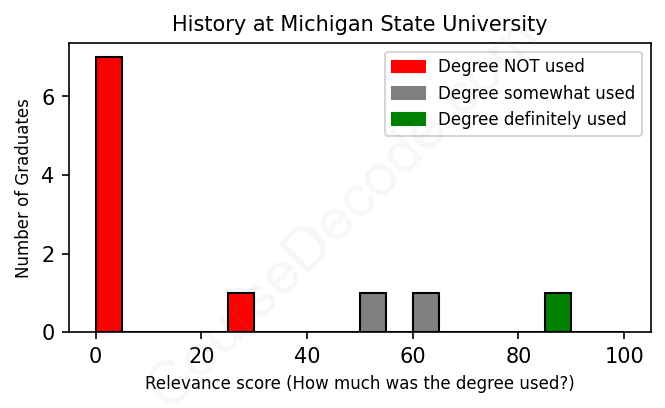
First, some facts. Of the History graduates from Michigan State University we've analyzed , here's how many have used (or NOT used) their degree in their career:

These are estimates based on AI analysis of 11 LinkedIn profiles (see below).
The verdict? Horrible! Overall, with an average relevance score of 20%, History graduates from Michigan State University have an exceptionally lower likelihood (-47%) of finding work in this field compared to the average graduate across all fields:
And for comparison, here's the chart for all profiles we've looked at across all degrees.
Also, after graduating, 36% of these graduates have pursued further education other than another Bachelor's degree (such as a Masters degree or other), compared to the average across all profiles of 35%. This suggests you may need more than just a Bachelors degree to be competitive as a History graduate.
See the details:
|
Relevance score: 0% We think this person has NOT gone into a career related to their degree. We think this person has NOT gone into a career related to their degree.
DEGREE INFOGraduated in 2015 from Michigan State University with a Bachelors Degree in History. Also pursued further education since (see below). JOB HISTORY SINCE GRADUATIONStore Manager Tuesday Morning Jan 2016 - Jul 2016 Payroll Specialist  PrimePay Jul 2016 - Oct 2019 Junior Accountant/Billing & Expense Coordinator  OneStream Software Oct 2019 - Dec 2020 Payroll Specialist II  PrimePay Jun 2021 - Dec 2023 Payroll Specialist  University Compounding Pharmacy Mar 2024 - Present FURTHER DEGREES DONE SINCE GRADUATINGMaster of Science - MSWalsh College 2021 - 2023 ABOUTNo information provided. |
The top 10 most common jobs done by the graduates we've analyzed (ranked most common to least) are:
Here is a visual representation of the most common words in job titles for History graduates (this is across all History graduates we've analyzed, not just those who went to Michigan State University):

Looking at the career trajectories of people who graduated with a History degree from Michigan State University, it's a mixed bag. For many, the first jobs out of college seem to dip into a variety of roles that don’t necessarily align closely with their major. A few started off in internships related to community collaboration and education, while others found themselves in sales or service positions. Despite the degree, it looks like many graduates end up in the service industry or sales-oriented roles initially, which isn't uncommon for humanities grads trying to find their footing.
As time goes on—say five or ten years after graduation—there's a noticeable shift. Some of these graduates seem to land roles that are more aligned with their interests or utilize skills honed during their studies. For instance, a few have moved into education as substitute teachers, academic coordinators, or graduate assistants, while others found careers in marketing and real estate. However, it's clear that a significant number are still working in non-history-related jobs, particularly in sales or the service sector. It's important to recognize that while a History degree can open doors to various fields, many graduates may not end up in roles directly related to their studies, at least in the early years post-graduation. So, if you’re thinking about what you might do with a History degree, be ready for a journey that could take you through some unexpected but valuable experiences along the way!
Honestly, a Bachelor’s degree in History at Michigan State University—or really anywhere, for that matter—can be a bit of a mixed bag when it comes to difficulty. It’s not just about memorizing dates and events; there’s a lot of reading, writing, and critical thinking involved. If you love digging into different cultures and analyzing various perspectives, it can be pretty enjoyable, but if you’re not so into reading long texts and writing papers, it might feel tougher than average. Overall, it’s definitely more rigorous than something like a general studies degree, but if you have a passion for the subject, you might find it easier to handle than you thought!
Most commonly, in the LinkedIn profiles we've looked at, it takes people 4 years to finish a Bachelor degree in History.
Looking at the job history of these Michigan State University graduates, it seems like they’ve had a pretty mixed bag when it comes to making good money. Some, like the Buyer Specialist in real estate, probably pull in decent earnings with commissions and all that, but others have bounced around through temp or part-time roles like substitute teaching and food service, which typically don’t pay much. There are also a few who seem to have settled into more stable and potentially better-paying positions, like payroll specialists and account representatives, especially considering they have been in those roles for a while. Overall, it’s safe to say that while some of these grads likely have a solid income now, others are still working their way up and probably didn’t start off making the big bucks right away.
Here is a visual representation of the most common words seen in the "about" section of LinkedIn profiles who have a Bachelor degree in History (this is across all History graduates we've analyzed, not just those who went to Michigan State University). This may or may not be useful:

Here are all colleges offering a Bachelor degree in History (ordered by the average relevance score of their History graduates, best to worst) where we have analyzed at least 10 of their graduates: